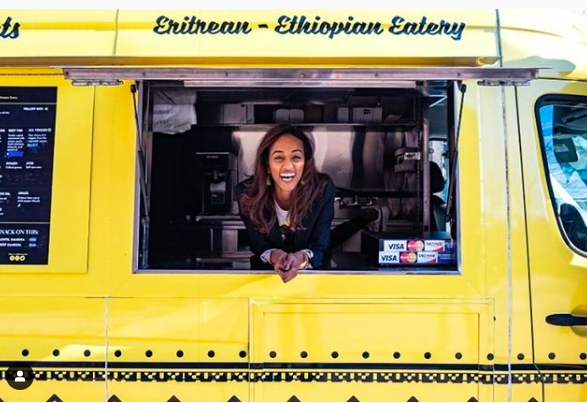The Food truck business is booming. In 2013, an estimated 3,281 food truck establishments existed. In 2020, the number of active food trucks in the U.S. was more than 24,000.
Starting a food truck business costs around $55,000 on average, with an annual revenue that ranges between $250,000 and $500,000, according to Small Biz Genius.

At the typical food truck in New York City you might find hot dogs, gyros, halal meals, tacos and even soul food. But Ethiopian?
Eden Egziabher thought a food truck selling Ethiopian food was a good idea — and she’s finding she was right.
Egziabher is the first Eritrean-American female entrepreneur in NYC with a food truck serving Habesha food. Habesha refers to people of Ethiopian and Eritrean heritage.
Egziabher, born in Ethiopia to parents of Eritrean descent, opened the Makina Cafe food truck in August 2017. Having been raised with a mix of Ethiopian, Eritrean, and Italian cultures — part of Ethiopia was occupied by Italy in the 1930s — their meals combine flavors of these cuisines. In fact, Makina actually translates to truck in all three of these countries’ languages.
Makina Cafe dishes out breakfast and lunch to hungry New Yorkers in Manhattan, Brooklyn and Queens. “The recipes are a collection of family recipes put together and adjusted to cater to the NYC market,” Egziabher says.

The truck’s schedule and locations are posted on the Makina Cafe Instagram page and its website.
As of now, the truck also delivers directly or through Grubhub and DoorDash.
All customers get Injera (a sourdough flatbread), then a pick of two vegetables such as Miser (a spicy whole red lentil stew) or Tikel Gomen (cabbage with carrots and potato in a turmeric ginger suave), and a protein. Among the selections of proteins are chicken TIBS bowl (a diced chicken made with an Ethiopian spice called TIBS), Siga Wot (a slow-cooked beef stew), or Doro Wot (a slow-cooked chicken). And of course, there’s a selection of sauces: Awaze, a chili pepper barbecue sauce and Makina sauce, a jalapeno-based sauce. The Makina Cafe also serves Ethiopian coffee and Dona-spiced sodas as well as Ethiopian snacks.
Egziabher was working in corporate America and was looking for a new career direction when the concept of Makina was born in 2016. “I have an MBA in marketing; I was a marketing manager for a hospitality firm based in Brooklyn,” she said.
With more New Yorkers discovering and enjoying Ethiopian food, Egziabher thought a mobile way to bring the cuisine to the boroughs was a great idea. “New Yorkers are foodies in general, so I knew once they tried they would come back, but I had to do some research to find the right demographic and go to that area until we built a reputation,” she said.
“I wanted a fast-casual concept, and I thought a food truck would be a great way to introduce that,” Egziabher added.
Egziabher tested out her concept with a targeted audience. “For example, when we started, we parked East midtown because the Eritrean/Ethiopian consulates were located there, and we thought that would be good exposure.”
She got a range of reactions. “In the beginning, we saw many reactions; some were extremely surprised that what we did was even possible (we had to answer a lot of questions), some were skeptical and discouraging.”
But the discouragement didn’t last long. Makina Cafe attracted loyal customers who continued to come back. Then the pandemic hit.
“Our food truck business was directly impacted,” said Egziabher. “We pivoted towards other business models such as catering and e-commerce.”
She hopes to expand Makina to other parts of the U.S. and use Makina Cafe as a charitable platform that gives back to the community.




